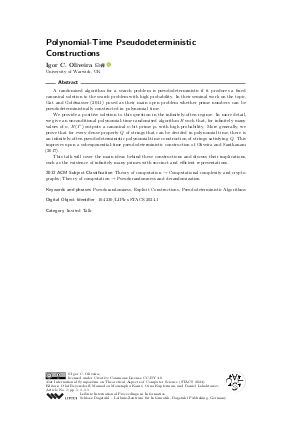Polynomial-Time Pseudodeterministic Constructions (Invited Talk)
Author
Igor C. Oliveira 
-
Part of:
Volume:
41st International Symposium on Theoretical Aspects of Computer Science (STACS 2024)
Part of: Series: Leibniz International Proceedings in Informatics (LIPIcs)
Part of: Conference: Symposium on Theoretical Aspects of Computer Science (STACS) - License:
 Creative Commons Attribution 4.0 International license
Creative Commons Attribution 4.0 International license
- Publication Date: 2024-03-11
File

PDF
LIPIcs.STACS.2024.1.pdf
- Filesize: 348 kB
- 1 pages
Document Identifiers
Subject Classification
ACM Subject Classification
- Theory of computation → Computational complexity and cryptography
- Theory of computation → Pseudorandomness and derandomization
Keywords
- Pseudorandomness
- Explicit Constructions
- Pseudodeterministic Algorithms
Metrics
- Access Statistics
-
Total Accesses (updated on a weekly basis)
0PDF Downloads0Metadata Views
Abstract
A randomised algorithm for a search problem is pseudodeterministic if it produces a fixed canonical solution to the search problem with high probability. In their seminal work on the topic, Gat and Goldwasser (2011) posed as their main open problem whether prime numbers can be pseudodeterministically constructed in polynomial time. We provide a positive solution to this question in the infinitely-often regime. In more detail, we give an unconditional polynomial-time randomised algorithm B such that, for infinitely many values of n, B(1ⁿ) outputs a canonical n-bit prime p_n with high probability. More generally, we prove that for every dense property Q of strings that can be decided in polynomial time, there is an infinitely-often pseudodeterministic polynomial-time construction of strings satisfying Q. This improves upon a subexponential-time pseudodeterministic construction of Oliveira and Santhanam (2017). This talk will cover the main ideas behind these constructions and discuss their implications, such as the existence of infinitely many primes with succinct and efficient representations.
Cite As Get BibTex
Igor C. Oliveira. Polynomial-Time Pseudodeterministic Constructions (Invited Talk). In 41st International Symposium on Theoretical Aspects of Computer Science (STACS 2024). Leibniz International Proceedings in Informatics (LIPIcs), Volume 289, p. 1:1, Schloss Dagstuhl – Leibniz-Zentrum für Informatik (2024)
https://doi.org/10.4230/LIPIcs.STACS.2024.1
BibTex
@InProceedings{oliveira:LIPIcs.STACS.2024.1,
author = {Oliveira, Igor C.},
title = {{Polynomial-Time Pseudodeterministic Constructions}},
booktitle = {41st International Symposium on Theoretical Aspects of Computer Science (STACS 2024)},
pages = {1:1--1:1},
series = {Leibniz International Proceedings in Informatics (LIPIcs)},
ISBN = {978-3-95977-311-9},
ISSN = {1868-8969},
year = {2024},
volume = {289},
editor = {Beyersdorff, Olaf and Kant\'{e}, Mamadou Moustapha and Kupferman, Orna and Lokshtanov, Daniel},
publisher = {Schloss Dagstuhl -- Leibniz-Zentrum f{\"u}r Informatik},
address = {Dagstuhl, Germany},
URL = {https://drops.dagstuhl.de/entities/document/10.4230/LIPIcs.STACS.2024.1},
URN = {urn:nbn:de:0030-drops-197112},
doi = {10.4230/LIPIcs.STACS.2024.1},
annote = {Keywords: Pseudorandomness, Explicit Constructions, Pseudodeterministic Algorithms}
}
